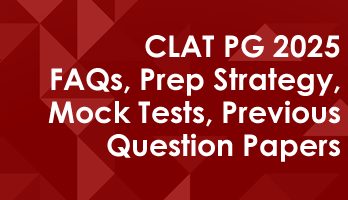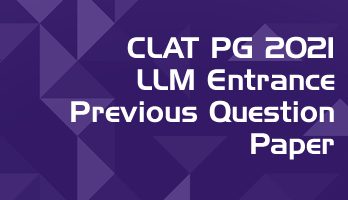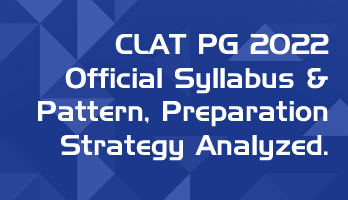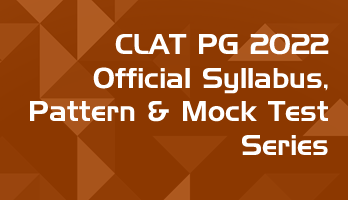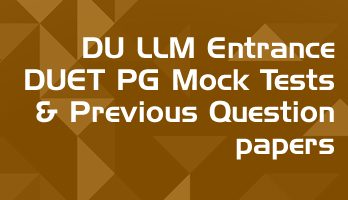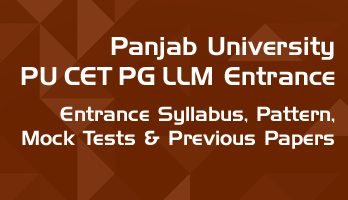The PGCETL – Post Graduate Common Entrance Test in Law is the admission test introduced by the Bar Council of India – BCI, for selection to various Post Graduate Programs in Law – PGPL and LL.M programs offered by various Universities and Law Schools across India.
This entrance exam is rolled out in conjunction with the revised pattern of the LL.M courses as per the Bar Council of India Legal Education (Post-Graduate, Doctoral, Executive, Vocational, Clinical and other Continuing Education), Rules.
The PGCETL is conducted annually under the aegis of the Bar Council of India, either directly or through the Bar Council of India Trust.
In this article, we will briefly touch upon the Eligibility Criteria, Applicability of the PGCETL, Syllabus, Pattern, Mock Test Series, Model Papers and other basic details.
Considering that the exam has been announced recently, this article will be updated with the details of the PGCETL Mock Test series on the basis of further official information becoming available in 2026 and 2027. The initial iteration of this article is based upon the limited information available at this time.
Regulation of Legal Education in India
As per the new education policy of the Government of India, all legal education in India – at undergraduate and post graduate levels – such as LL.B, LL.M and other Post Graduate Programs in Law will be regulated by the Bar Council of India – BCI.
The Advocates Act, 1961 confers to the BCI, the responsibility for regulating and promoting legal education in India.
Post Graduate programs in Law, which were previously under the remit of the UGC, are now overseen by the BCI.
Minimum Eligibility for PGCETL
Educational Qualifications for PGCETL
For admission into any BCI approved LLM program, the minimum academic eligibility will be a pass in the three year LL.B. or a five year LL.B. in an integrated Law degree course, securing the minimum percentage of marks as may be notified by the PGCETL Entrance Examination Testing Body of Bar Council of India either through All India Entrance Test or at the state level as the case may be.
The specific cut-off percentage marks will be announced in the official notification for the PGCETL examination in announced in 2026 and 2027.
Age limit for for PGCETL
As of now, there is no specific upper age limit mentioned for the PGCETL examination. The final details will be as per the official notification to be published ahead of the examination in 2026 and 2027.
Applicability of the PGCETL
Universities approved by the UGC under Section 2(f) of the UGC Act, 1956, having a Law Faculty or department of Law or School of Law including a Constituent College , with a duly constituted Council for Post Graduate Studies in Law & Research can offer PGPL Courses – such as Master’s Degree Program in Law – LL.M, with the approval from the Bar Council of India.
Applicants seeking admission to the BCI approved PGPL, LLM programs need to submit the score in the PGCETL for the relevant academic year and admission shall be based on merit and rank in the PGCETL, subject to applicable rules of classification and reservation in the state of the institution (e.g domicile reservation).
LL.M programs may be generic (without any specialization) or with specialization in various branches of law, such as Constitution & Public Law, Criminal Law, Business Law, International Law, International Trade Law, Labour Law, Taxation, Banking & Insurance Law, International Commercial Dispute Resolution, Women and the Child law, Public Policy & Governance, Human Right Laws, and Intellectual Property Right, Technology & Law.
Syllabus for PGCETL
The syllabus for the PGCETL will be based on the core subjects of the standard LL.B program – as approved by the Bar Council of India’s legal education rules. Additional topics may be added as per the official notification released in 2026 and 2027.
- Jurisprudence (Legal method, Indian legal system, and basic theory of law).
- Law of Contract
- Special Contract / Commercial Agreements
- Law of Tort including Motor Vehicle Accident and Consumer Protection Laws
- Family Law including Hindu and Muslim Personal Laws
- Law of Crimes – Penal Code and Criminal Procedure Code
- Constitutional Law
- Transfer of Property Law
- Law of Evidence
- Civil Procedure Code and Limitation Act
- Administrative Law
- Company Law
- Public International
- Principles of Taxation Law
- Environmental Law
- Labour and Industrial Law
Question paper pattern for PGCETL
The PGCETL examination will be a multiple choice objective type exam. The specific number of questions, the negative marking as applicable and the section-wise break up will be as per the official notifications published in 2026 and 2027.
BCI may choose to include a ‘subjective’ part in the exam, requiring candidates to write essays on the given topics or descriptive answers to the questions given in the PGCETL. The final for the year will be as per the official notification.
The exam may be held in an online – exam center based mode or in an office pen-and-paper mode; as per the official announcement of the year.
PGCETL Mock Test Series and Model Papers
LawMint will be publishing Mock Test Series and model papers for the PGCETL, based on the pattern and syllabus as per the official notification to be published in 2026 and 2027.
The Mock test series and Model papers online prep pack will be updated as the official notification for the year.
Study Material for PGCETL
As the syllabus for the PGCETL is based on the standard LL.B syllabus like the AIBE (All India Bar Examination), BCI may not provide any official study material for the exam and no specific long term coaching classes may be required.
Students can make use of their LL.B text books and notes to prepare for the PGCETL.
The LawMint Online Mock Test and Model Paper series for PGCETL will include essential reference material as a subject and topic refresher.
Important Note : This article is based on tentative details and information as available at the time of publication. This article will be updated as more information becomes available.


